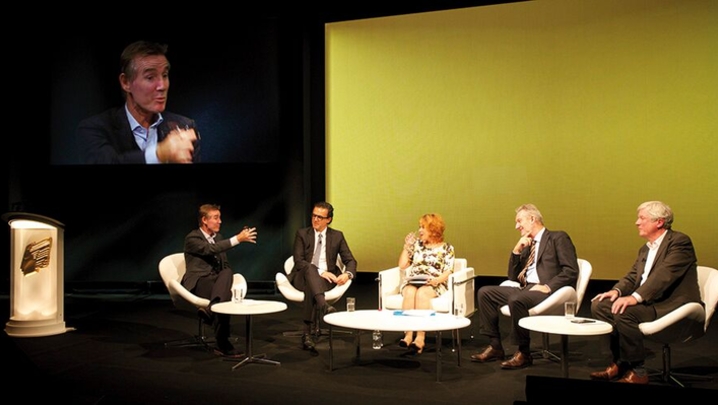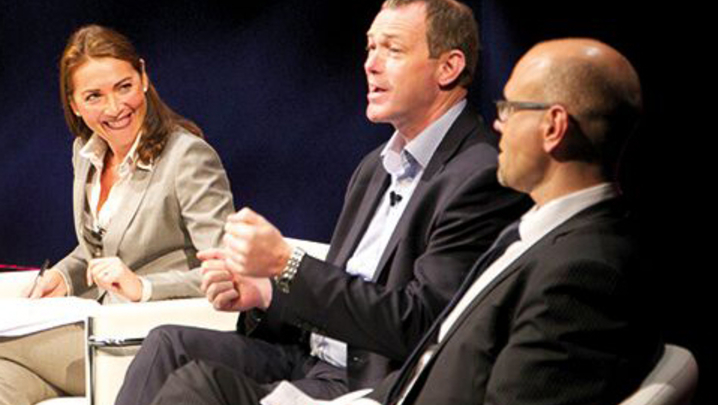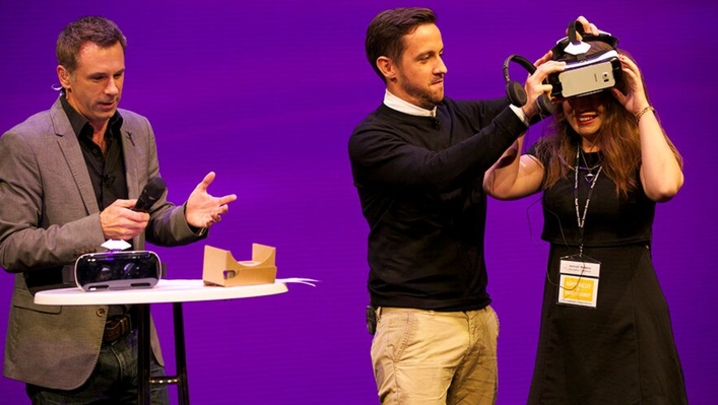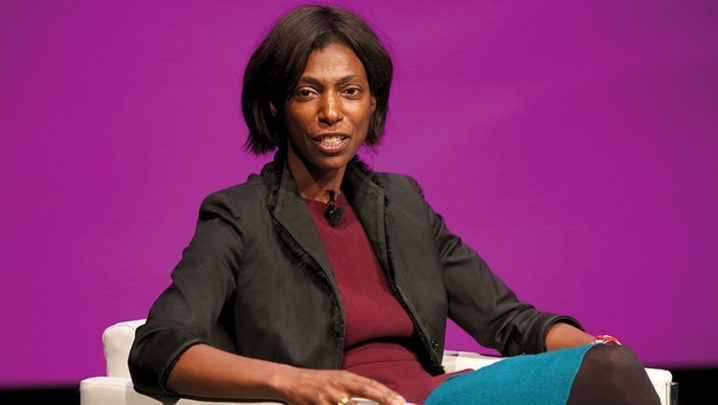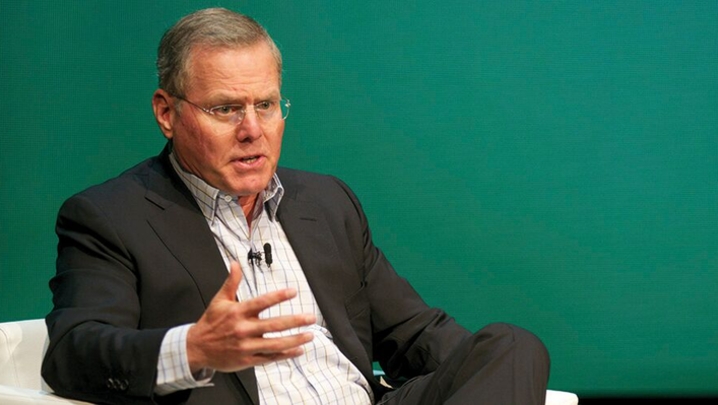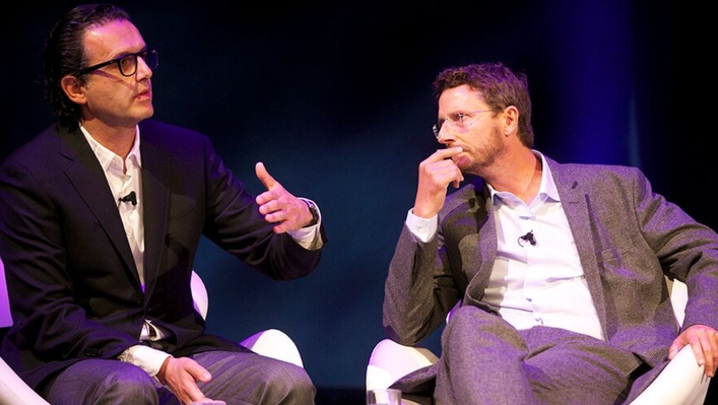Cambridge Convention 2015 Session Fourteen: Top presenters, such as Jeremy Clarkson and Chris Evans, are TV’s lifeblood. But do they have too much power and are they overpaid?
Since Jeremy Clarkson punched his Top Gear producer, Oisin Tymon, during a row over the lack of a hot meal, the problems of managing talent have been centre stage.
Former BBC Controller of Entertainment Commissioning Jane Lush said that the fracas distilled some of the key questions that executives and programme-makers face: “How powerful is talent, where do you draw the line on bad behaviour and is top talent really irreplaceable?”
It sparked a fascinating and frank debate among the Cambridge panellists.
When Lush asked what he would have done, had Clarkson been working for him, Sky’s Stuart Murphy said: “Hats off to the BBC. You can’t have a set of values that you live by and the whole organisation corrals behind and then you junk them the moment one of your presenters goes rogue.
“I phoned Danny Cohen to say you’ve got our support,” he revealed. Murphy thought it was interesting that no other broadcaster had criticised the BBC for sacking Clarkson.
Asked how he would have handled the Top Gear presenter’s escalating desire to push boundaries, Murphy said: “You’d probably want to have a conversation where he could save face, and you could save face.”
One option would be to give him a show where he wasn’t encouraged to say tasteless things: “So you’d probably, I guess, put him on a military history series.” Murphy said that Clarkson was “not someone we’d want to work with”, explaining: “We’re a family brand. It’s really important – people are paying for us each month, it’s important we reflect their values, as well. The discussion we had at work lasted, literally, 10 seconds.”
Murphy drew applause when he said: “You can’t just junk your brand the minute something with a huge pound sign comes along. It would’ve been short-term gain for long-term mess, I think.
“Who, nowadays, is happy with someone saying the word nigger? I’m sorry, but that’s not acceptable. [Clarkson’s] view was that it wasn’t transmitted, but, come on – people who use that word… there’s no need to say that.… Then, for him to be so tentative about an apology and loving the fact that he was a naughty schoolboy….Grow up, it’s a different age, grow up.”
Danielle Lux said that “talent are human beings” and they respond to “nurturing and understanding”.
She suggested that “good management comes from a great relationship with them”, but acknowledged that “there’s a moral line there. You can’t condone physical abuse, you can’t condone bullying.”
"Anyone who thinks they are irreplaceable is very foolish"
Lux, who, like Lush and Murphy, has worked at the BBC, added: “Of course, the BBC made the right decision at that point… he probably should have had a hot meal, but the response is not to punch somebody.”
If Clarkson had been on his books, agent Jonathan Shalit said he would “have had to defend my client. Privately, I’d have said, ‘You’re an idiot.’”
Shalit pointed out that a level playing field was important: “Some people are very well known in the industry… senior producers, particularly at ITV, who were fired for bullying, and you can’t have execs fired for bullying but the presenters are not.”
Had Clarkson had the last laugh, asked Lush, with the lucrative, three-year deal, reportedly worth £160m, that his team has signed with Amazon?
“Definitely,” thought Shalit: “I was talking to a very senior executive who made an offer to the Top Gear boys, one of the Sony/Universal kind of boys, and offered them a five-year deal. They wanted a three-year deal… so, probably, they are having the last laugh.”
But Shalit wondered how easy it would be for Clarkson to return to mainstream prime-time TV in three years’ time – although “he’s made enough money to go and retire”.
He said he admired Richard Hammond for his loyalty, but wondered if he had missed a trick, as he could have “gone on to become a very significant mainstream presenter”.
For Lux, Chris Evans taking over at Top Gear was the “most potent example” of whether or not talent was irreplaceable. “The people we cherish are those who imbue that show with authorship. That’s why it is hard to keep shows running without them, but it’s not impossible,” she said.
She added that shows could be skewed to adapt to new presenters.
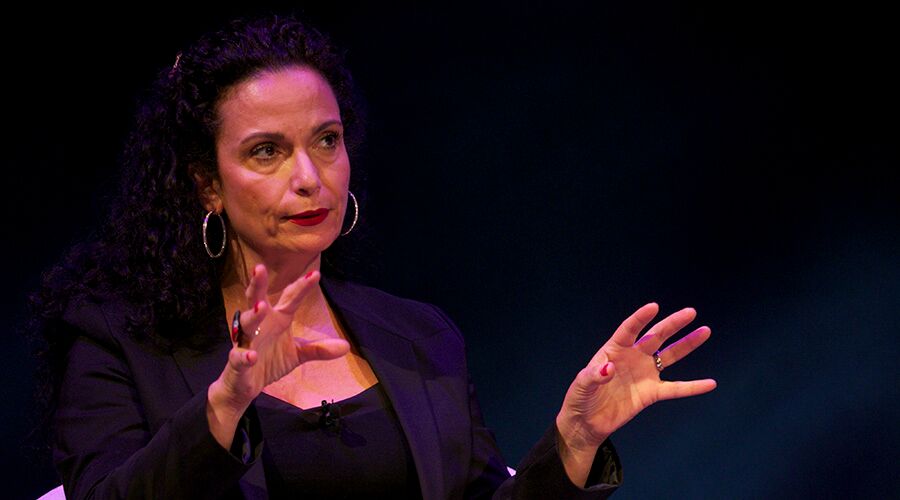
Shalit warned that “anyone who thinks they are irreplaceable is very foolish. I always say to a client, never quit a hit.”
Lush said she thought that Adrian Chiles – whose career stalled after he and co-host Christine Bleakley quit The One Show for ITV’s Daybreak – “would agree with that”.
Shalit said that, if Bleakley had stayed at the BBC, she would probably have gone on to be “a Saturday-night queen”, and that she was badly advised. But he pointed out that Evans had form: he had taken over from Terry Wogan on Radio 2 and now “gets more listeners… so people clearly are replaceable”.
Is talent overpaid, wondered Lush. Murphy gave an interesting insight into how Sky judges how much to pay “as scientifically we can”, depending on what the person is doing for the broadcaster.
“We ask 3,000 people how they feel about 500 names every six months. We ask them, do you know them, do you like them, are they on their way up? Do you want to see more of them?
“Some people say they know them, they like them, they’re on their way up, but they don’t want to see more of them.”
Certain talent and creators are hired because they get a particular subscription message across or appeal to those viewers who might switch from Freeview to Sky. In a crowded advertising market, “you need someone who short-circuits to your world”, said Murphy.
Lux agreed that talent has “a different value for each broadcaster”. Her experience before casting James Corden as the host of A League of Their Own was that Sky wanted to know who the host was going to be.
The talent are “the people on that poster who are going to reach out and encourage people to buy the box and watch the programme” and “embody” brands, Lux noted.
How to break new and more diverse talent is something all broadcasters have to consider. Murphy stressed the importance of channels such as ITV2, E4 and BBC Three for nurturing fresh faces.
He said it was not necessarily what viewers came to Sky for, although there have been exceptions, such as Karl Pilkington. “Even there, in a spirit of openness and honesty, we needed a Ricky [Gervais]. Everyone needs a Ricky to have a Karl.
“We have tried with new talent. I just don’t think audiences expect Sky to do that. People do go to some of the public service broadcasters for a long-term relationship. People come to Sky for a treat and a dirty weekend.”
Lux said there is a “hard dynamic” that makes viewers watch a new show because they love a particular presenter, but added that unknowns could be brought on by channels such as Comedy Central.
Shalit reckoned that shows such as BBC Breakfast or Good Morning Britain were useful. They were ensemble shows with a guaranteed audience, so “you’ve got a better chance of giving someone a platform to go forward”.
Murphy said it was “embarrassing” for the industry that it was still working out how to encourage more diverse talent. Sky has, arguably, set the pace on diversity initiatives; it is incentivising production companies by offering faster meetings if they have “got talent that’s not a white man in his sixties pointing at something static”.
The panel wrestled with the question of why some presenters, such as Des Lynam, have switched channels and “discovered that they weren’t as popular as they thought they were”, as Lush put it.
Shalit said that even the – now successful – BBC star Graham Norton had experienced some issues when he moved from Channel 4 to the BBC, but the corporation had stuck with him.
The thorny issue of transferring YouTube stars to so-called “old media” was raised by a questioner from the floor. What advice would the panel give to new presenters?
Murphy replied: “Work out what your passion is, learn your voice and film yourself a lot. Then, if you do end up with a load of followers on social media, don’t be arrogant enough to assume that old media can’t help you.
“One of the conversations we’ve had at work is whether we blindly sign up people who have a great social-media following but, actually, don’t adhere to our values.”
He cited YouTube star KSI, who has around 7 million followers, but whose jokes are often misogynistic.
Murphy said that online media could learn from the values of the established broadcasters: “Actually, I think one of the reasons that British TV is amazing is that we have standards about taste, decency, respect, fairness and accuracy.
“I think new media talent could absolutely learn from that and should… have a moral responsibility to the next generation of consumers to give them the quality, taste, respect that we have on so-called old media.”
The panellists were: Danielle Lux, Managing Director, CPL Productions; Stuart Murphy, Director, Sky Entertainment Channels, Sky; and Professor Jonathan Shalit OBE, Chairman, ROAR Global. The session was chaired by Jane Lush, Managing Director, Kalooki Pictures, and produced by Samir Shah and Patrick Younge.
What talent really earns
Much of what politicians and newspapers say about the cost of talent is ‘hypocritical and untrue’, claimed agent Jonathan Shalit.
Following a question from the floor by Broadcast’s Jake Kanter about politicians querying how much the BBC should pay talent, Shalit said, ‘I think politicians, most of them, sit in glass houses… [they] are totally hypocritical about people in television.’
He said that ‘talent should get paid more per day’ because they did not get staff benefits, such as pensions or job security.
‘Ultimately, all jobs are about supply and demand…. If you’re a quality piece of talent, you should get paid the best rate you can,’ added Shalit. ‘The reality is that, for most talent, it will not last that long… and their salary will drop fairly quickly.’
He continued: ‘If you’re non-scripted talent, then you’ve got to be liked as a person.’
He gave the example of Christine Bleakley. ‘Everyone liked her’ when she started at the BBC. ‘Then she moved to ITV and The Daily Mail managed to portray her as a very greedy individual.
‘The Daily Mail often writes about how much talent get paid. People then quote what they read in there. It’s often not true. I know for a fact that the vast majority of talent is not paid that much.’
That prompted Daily Mail Media and Technology Editor Katherine Rushton, who was in the audience, to extend an ‘invitation to tell us’ how much they are actually paid.
‘It’s not for me to reveal,’ replied Shalit.
‘There you go,’ said Rushton, pointedly.


